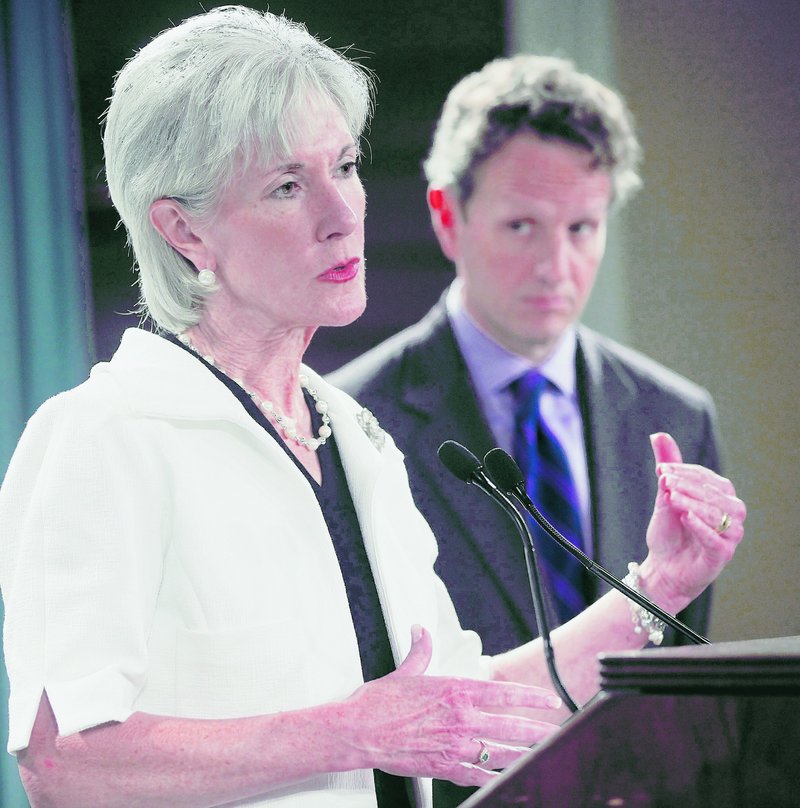WASHINGTON – Medicare is in better shape because of President Obama’s sweeping health care overhaul and will stay afloat a dozen years longer than had been projected, trustees forecast Thursday. But that depends on cuts in care that the Medicare system’s top analyst says are highly doubtful.
The annual report by the trustees who oversee Medicare and Social Security, led by Treasury Secretary Timothy Geithner, gives backers of the new health care law evidence of a positive impact on government entitlement programs, but it also undercuts the findings with a host of caveats.
In what amounted to a dissenting opinion, top Medicare actuary Richard Foster warned that the report’s financial projections “do not represent a reasonable expectation” for the hospital fund for America’s elderly.
Kathleen Sebelius, secretary of health and human services and one of the trustees, said they were required to assume current law in making their projections, including a cut in Medicare payments to doctors. She, too, doubted the cuts would ever happen, “which is why we continue to provide cautionary notes” in the report.
The trustees projected the Medicare Hospital trust fund would be exhausted in 2029, or 12 years later than estimated last year.
The news wasn’t as rosy for Social Security, which will pay out more in benefits than it collects in taxes for the first time in decades this year and next year. The Social Security trust funds are expected to be exhausted in 2037, the same date as in last year’s report.
More bad news for Social Security recipients: The trustees project no cost-of-living increase for Social Security recipients next year, the second year in a row with no increase. The adjustments are based on inflation.
The administration delayed the trustees report, which normally comes out in the spring, in order to recalculate projected spending estimates based on the new health care law.
Geithner said that while the report showed “very positive developments” from the new law, it also underscored “that we must continue to make progress addressing the financing challenges” facing both Medicare and Social Security.
Foster, the Medicare official, said in a statement included in the report that the program’s projected savings might not be realistic.
The short-run projections by his office were similar to those of the trustees, estimating that the Medicare trust fund would be exhausted in 2028, one year earlier.
However, by 2050, government actuaries see Medicare costs growing to more than 8 percent of the economy, compared with 3.6 percent now. The trustees assume Medicare will consume only 6 percent of the nation’s economy in 2050 — a difference that amounts to hundreds of billions of dollars.
The nonpartisan experts said there are two big reasons for their estimate of higher costs:
• The trustees’ report assumes that doctors will absorb a 30 percent cut in Medicare payments over the next three years. The cuts are called for under current law but are routinely waived by Congress because too many doctors would stop seeing Medicare patients.
• Projected savings in the new health care law from cuts to hospitals, nursing homes and other institutional providers will prove to be politically unsustainable in the long run.
“For these reasons, the financial projections shown in this report for Medicare do not represent a reasonable expectation for actual program operations in either the short range … or the long range,” Foster said.
John Rother, executive vice president of AARP, said it may not be known for years whether the law will generate the kind of savings anticipated on the trustees’ report.
“The purpose of the law was to slow the growth in health care costs,” Rother said. But “the fact is we really won’t know until some of the regulations get spelled out.”
Obama has formed a bipartisan fiscal commission that is working on recommendations to improve government finances, including those for Social Security. Its recommendations are due in December.
Send questions/comments to the editors.



Success. Please wait for the page to reload. If the page does not reload within 5 seconds, please refresh the page.
Enter your email and password to access comments.
Hi, to comment on stories you must . This profile is in addition to your subscription and website login.
Already have a commenting profile? .
Invalid username/password.
Please check your email to confirm and complete your registration.
Only subscribers are eligible to post comments. Please subscribe or login first for digital access. Here’s why.
Use the form below to reset your password. When you've submitted your account email, we will send an email with a reset code.